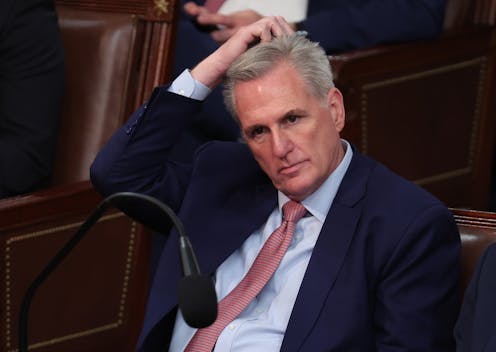
The arm-twisting, dealmaking and vote hunting around Kevin McCarthy’s quest to be named House speaker have put on full display the fact that razor-thin majorities in both the House and the Senate are becoming a fact of life at the federal level.
In multiple ballots conducted on Jan. 3, 2023 to elect the speaker of the House, McCarthy failed to get the required number of votes. Additional balloting is expected in the race for speaker.
Slim margins might make for dramatic television, but they create legislative and institutional uncertainty that has very real consequences for how Congress is run and how policy gets made.
Because the GOP’s 10-seat House majority is so small, McCarthy has had to placate the moderate wing, the right wing and the far-right wing of his conference – all at the same time – in his quest for the speaker’s gavel.
The GOP’s slim majority may actually get slimmer. This is because of seat vacancies caused by the early departures of members of Congress. These vacancies happen with regularity, and could have major impacts on the Republicans’ legislative agenda over the next two years.
A slim majority means that the Republican leadership can’t afford to lose support from even small groups of members within their party. But each congressional session, some members depart Congress early, leaving vacancies that can complicate party leaders’ efforts to placate their competing factions or blocs. Imagine, for example, that a moderate Republican member dies or resigns in the next few months. Will that person be replaced with another moderate? A Trump-aligned Republican? A Democrat?
With such a small advantage, the potential effect of this replacement is huge – not just for McCarthy, but for Congress as a whole, and the American people, whose lives are affected by legislation passed by Congress.

How do vacancies occur?
The 117th Congress, which met from Jan. 3, 2021, to Jan. 3, 2023, set a modern record with 15 vacancies, a rate unmatched going back to the 1950s. This was partly because of six member deaths, including Rep. Don Young, R-Alaska, the longest-serving House member at the time. A number of these vacancies occurred in the first days of the 117th, when several Democratic House members, including Cedric Richmond of Louisiana and Marcia Fudge of Ohio, took positions in the new Biden administration.
High-profile vacancies in recent history were due to other causes. Some members were forced to resign because of scandal, like Rep. Jeff Fortenberry, R-Neb., who was convicted in 2022 for lying to the FBI about illegal campaign contributions. Others cut short their current term, leaving Congress after losing their primaries, as Rep. Eric Cantor, a Virginia Republican, did in 2014. House Speaker John Boehner, a Republican from Ohio, resigned after facing threats of being ousted from leadership in 2015.
And although the 117th was a banner Congress for vacancies, the historical data demonstrates that they happen all the time. Based on my analysis, there are usually at least a handful of vacancies per two-year congressional cycle.
Resignation is the most common reason for departure in recent Congresses. However, at least one member – and often more than one – has died in all but one Congress in the past 70 years. The number of deaths that regularly occur among members is more than sufficient to change how the majority party functions in a closely contested Congress like this one.
This potentially leaves party leaders captive to some particular interest, either in their party or in the opposition party.
How are vacancies filled?
Although U.S. Senate vacancies are often – though not always – filled through an appointment by the governor of that state, the Constitution mandates that House vacancies be filled by special elections scheduled by the governor.
These elections usually happen within a few months of the vacancy. What this means is that there are real possibilities for the size of a party’s majority to shrink, or grow, between election years. And even if a majority party shift doesn’t happen, a district could still replace a moderate departing representative with an extremist, or vice versa.
Special elections have received significant focus from the media and the public in recent years. That’s mainly because their results, when compared with the most recent result for that seat, can be bellwethers for how the next set of congressional elections will turn out.
For example, a number of special elections throughout 2022 — including the Alaska race to replace Young — showed even or Democratic-leaning results compared with 2020, giving early indications that the “red wave” many experts predicted would not actually materialize.
What does this mean for the 118th Congress?
A vacating member, and the special election that decides a successor, is not just an electoral crystal ball. It can have major implications for the balance of power in Congress; any GOP leader will have to manage these implications.
On the right, there is the 44-member House Freedom Caucus and, more specifically, the “MAGA Squad” – think Lauren Boebert, Matt Gaetz and Andy Biggs. To the left, there’s a swath of more moderate Republicans from such states as New York and Ohio with no intention of letting far-right firebrand Marjorie Taylor Greene control the agenda.
These are two factions of Republicans who want vastly different action in the 118th Congress. The moderate bloc understands that, with a Democratic Senate and Joe Biden as president, compromise with Democrats may be necessary for legislative achievement.
Meanwhile, the far-right bloc has made other priorities clear, such as relentlessly investigating Biden, his administration and his family. Managing these competing demands will be hard enough for the new House speaker and unexpected vacancies could make the task even harder.
Beyond the tensions among Republicans, Democrats will be ready to pounce on any opportunity to divide and conquer. The recent revelations surrounding incoming Rep. George Santos, a Republican from New York, who allegedly fabricated huge portions of his résumé and personal story during his campaign, represent one such potential opportunity. If Santos is forced to resign, a Democratic victory in a special election in his Long Island swing district could cut the GOP’s majority from 10 to eight.
Even if special elections don’t change a party’s control over certain seats, vacancies can and will throw the 118th House of Representatives into chaos by shifting the balance of power from one ideological bloc to another. More chaos, that is, than it is already enduring.
Charles R. Hunt does not work for, consult, own shares in or receive funding from any company or organization that would benefit from this article, and has disclosed no relevant affiliations beyond their academic appointment.
This article was originally published on The Conversation. Read the original article.







